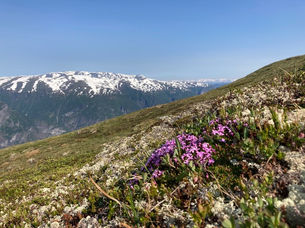
RangeX
The RangeX project (“Mechanisms underlying the success and impacts on biodiversity and ecosystem functioning of range-expanding species under climate change”, https://rangex.w.uib.no/) seeks to better understand the processes and impacts of plants that are expanding their ranges following climate warming, and to use this knowledge to inform the development of policy regarding range-expanding plant species.
RangeX has been recommended for funding by the BiodivERsA COFUND Call on Biodiversity and Climate Change. The project consortium involves partners from Chile, Denmark, France, Germany, Norway, South Africa, Sweden and Switzerland, and will work closely with collaborators from across the MIREN network.
If you need further information, you can contact us
Overview
Species are shifting their distributions in response to global warming and through biological invasions, many expanding their ranges across elevation gradients. But they are doing so at widely different rates, leading to a reassembly of ecological communities that could have even more profound impacts on the future of biodiversity, ecosystem functioning, and nature's benefits to people. In particular, changes to species interactions in novel communities could mediate effects of climate warming on biodiversity, and on key ecosystem functions like carbon cycling and pollination, which could in turn feedback to climate warming. To anticipate and respond to these challenges and opportunities, we require both a process- based understanding of range expansions, and a shared understanding of this issue between researchers, natural resource managers and policy- makers.
RangeX consortium
Jake Alexander – ETH Zurich, Switzerland
Anne Bjorkman – University of Gothenburg, Sweden
Ralph Clark – University of the Free State, South Africa
Sylvia Haider – Martin-Luther-Universität Halle-Wittenberg, Germany
Olga Hilmo – Norwegian Biodiversity Information Centre, Norway
Toke Høye – Aarhus University, Denmark
Paul Kardol – Swedish University of Agricultural Sciences, Sweden
Jonathan Lenoir – Centre National de la Recherche Scientifique (CNRS), France
Aníbal Pauchard – Universidad de Concepción, Chile
Vigdis Vandvik – University of Bergen, Norway
MIREN network
Four Key questions
-
What processes explain variation in species’ range expansion with climate warming?
-
Can we predict which species are most/least able to expand their ranges with climate warming, and their impact on ecosystem processes?
-
Can better ecological understanding of range expansions be synthesised with stakeholder knowledge to improve policy and management of range expansions and biodiversity?
-
How do range-expanding species impact biodiversity and key ecosystem functions, and how will these impacts feedback to changing climate?
Our Approach
To tackle our overarching questions, we focus on elevation gradients in mountains as both ideal natural laboratories to test hypotheses about the proximate drivers and impacts of range expansions, and potentially highly suitable “early warning systems” to detect the changes in biodiversity and ecosystem functioning. We adopt a hierarchical approach, nesting detailed experimental and comparative studies within the global MIREN network of researchers and managers using standardized methodology to study plant range expansions in mountains. In this way we will tease-apart mechanisms underlying range expansions and their impacts, and interrogate their generality by performing analyses that integrate our experimental results with detailed survey data from up to 22 mountain regions around the world. We will work with national and international stakeholders through participatory workshops and surveys to synthesise knowledge and co-develop a joint problem understanding of range-expanding species, and co-produce outputs and targeted dissemination strategies to improve awareness and integration of range-expanding species in regional and global policy.
©Chelsea Chisholm
©Aud Halbritter
©Loic Liberati


